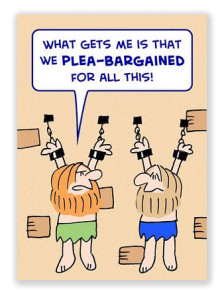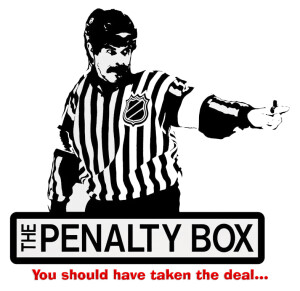We post news and comment on federal criminal justice issues, focused primarily on trial and post-conviction matters, legislative initiatives, and sentencing issues.

DISTRICT COURT HOLDS USSG 3E1.1 THIRD POINT UNCONSTITUTIONAL
In federal criminal justice, the “trial penalty” is the difference between the sentence criminal defendants typically receive after a plea bargain and the much higher sentence they get if they are convicted at trial.
 An experienced federal defense attorney I once knew called it paying rent on the courtroom. The expression is not uncommon.
An experienced federal defense attorney I once knew called it paying rent on the courtroom. The expression is not uncommon.
That difference can be huge. The National Association of Criminal Defense Lawyers says that “federal trial sentences are roughly three times higher than plea sentences for the same crime on average and sometimes as much as eight or ten times higher. This sentencing differential is extremely coercive. As a result, only 2-3% of federal convictions are the result of trial. The rest are plea bargains.”
NPR reports that 98% of federal criminal cases end with a plea bargain. A 2023 American Bar Association task force that included prosecutors, judges, defense attorneys and academics cited “substantial evidence” that innocent people are coerced into guilty pleas because of the power prosecutors hold over them, including the prospect of decades-long mandatory minimum sentences.
“Trials have become rare legal artifacts in most U.S. jurisdictions, and even nonexistent in others,” the ABA Plea Bargain Task Force concluded.
 Last week, Southern District of New York U.S. District Judge Jeb Rakoff (who “has been complaining, in various ways in various fora, about the severity to the federal sentencing guidelines, mandatory minimum sentencing statutes and the “trial penalty” for many years,” as Ohio State University law professor Doug Berman as aptly put it), ruled that U.S. Sentencing Guideline § 3E1.1(b) exacerbates the “trial penalty” in a way that violates the 6th Amendment.
Last week, Southern District of New York U.S. District Judge Jeb Rakoff (who “has been complaining, in various ways in various fora, about the severity to the federal sentencing guidelines, mandatory minimum sentencing statutes and the “trial penalty” for many years,” as Ohio State University law professor Doug Berman as aptly put it), ruled that U.S. Sentencing Guideline § 3E1.1(b) exacerbates the “trial penalty” in a way that violates the 6th Amendment.
Section 3E1.1 awards two reduction points to defendants who accept responsibility for their offenses (admit guilt with a reasonable degree of convincingness). If a defendant qualifies for the two points allowed by § 3E1.1(a), she can earn an extra one-point deduction (at the government’s sole election) under § 3E1.1(b) if she saves the government’s resources by pleading guilty early, thus avoiding the need for the U.S. Attorney to prepare for trial. In practice, however, the government has occasionally used the point to cadge defendants into surrendering assets, waiving sentencing objections, forgoing appeal, and other surrenders of rights having nothing to do with timeliness of plea.
 Judge Rakoff’s objection to § 3E1.1(b) is more basic than a complaint about government overreach. He argues that the third point is an unconstitutional restriction on a defendant’s 6th Amendment right to a jury trial by making the “trial penalty” even higher. Judge Rakoff wrote:
Judge Rakoff’s objection to § 3E1.1(b) is more basic than a complaint about government overreach. He argues that the third point is an unconstitutional restriction on a defendant’s 6th Amendment right to a jury trial by making the “trial penalty” even higher. Judge Rakoff wrote:
[T]he Sentencing Guidelines effectively reinforce the trial penalty by reducing the offense level calculation by two points if the defendant “clearly demonstrates acceptance of responsibility” by pleading guilty, and by a third point if, in the Government’s view, the defendant has pled guilty quickly enough to permit the prosecutor to avoid preparing for trial. U.S.S.G. § 3E1.1. While the underlying theory of the two-point reduction is that a guilty plea evidences, and rewards, a defendant’s remorse, the third-point reduction is justified simply on the ground of saving prosecutorial resources…
Because of the odd way in which 3E1.1 as a whole is phrased — as a reduction in offense level for a defendant’s not exercising his constitutional right to go to trial — the remedy for the Court’s conclusion that § 3E1.1(b) is unconstitutional is to reduce the penalty thereby effectively imposed on those who choose not to avail themselves of the “benefit” of § 3E1.1(b). The Court therefore concludes that in this, and indeed every case in which a defendant chooses to go to trial but is convicted by a jury, or in which the defendant simply chooses to consider going to trial until after the Government has already started preparing for trial, the formal calculation of the offense level must be reduced by one point…
United States v. Tavberidze, Case No. 23-cr-585-03, 2025 U.S. Dist. LEXIS 43082 (S.D.N.Y., March 10, 2025)
Sentencing Law and Policy, Judge Rakoff asserts USSG § 3E1.1(b) is “effectively an unconstitutional penalty” on Sixth Amendment trial rights
(March 12, 2025)
American Bar Association, Criminal Justice Section, Plea Bargain Task Force Report (February 2023)
– Thomas L. Root



